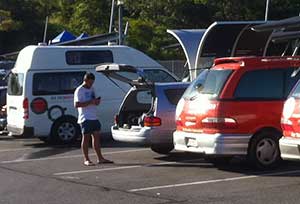SOME campervan hire companies are dishing out pamphlets advising
backpackers how they can flout the law, claims a former Victorian
policeman.
The 62-year-old retired officer now caravanner, who wants to only be known
as Ronin, told Caravanning News: "In my 30 years of law enforcement
I have never seen or heard of a backpacker paying a fine ... and trust me
I have fined a few."
Ronin said overseas travellers soon learn by word of mouth how to avoid
paying fines and caravan park fees.
He said that in some cases pamphlets explaining how it can be done were
supplied at backpacker hotels and even handed out when backpackers hired
campervans.
"The pamphlets contain information not only on flouting traffic laws but
how to get freebies while travelling Australia," he claimed.
Illegally camped backpackers in their campervans, and in some cases
caravans, have created a headache for numerous seaside towns.
Many backpackers interviewed by Caravanning News admitted they were
willing to risk on-the-spot fines for illegally camping overnight in a
carpark or street.
"We know all the tricks and can get away with not paying up," explained one
round-Australia traveller from
Britain.
"We're here for only a few weeks and then leave the country. No authority
ever bothers to chase payment."
Another commented: "Australians are well known in backpacker circles
for their hospitality. It's a great place to spend a holiday when you're
travelling on the cheap. Yes, we do use caravan parks but only when
absolutely necessary ... they are far too expensive."
Ronin said there were many reasons for not chasing up unpaid fines, but
basically it was "just too hard" for law enforcement or councils.
"For instance, you detect an offence and issue an on-the-spot fine. This
could be for traffic, council or minor criminal offence.
"The accused then has 28 days to pay that fine, but most backpackers have
moved on by then anyway.
"If the accused hasn't paid after 28 days then the matter is heard by a
court and this could take from three to 28 days to get to court and in the
case of minor criminal offences up to three to six months."
If an accused fails to appear, the court could issue a 'payment warrant'.
"Police or a sheriff must then find the accused ... and the best of luck
trying to find a backpacker's location after four months," Ronin said.
The warrant was put into storage where it stayed for three years years,
when it would then be expunged.
"I had many persons that were fined for traffic and minor criminal
offences only to have the warrant cancelled because we could not
find them again," Ronin said.
International Driving Permits were of little help in tracing offenders
because addresses often could not be verified, he added.
It was not a requirement for backpackers to pay fines before leaving
Australia, unlike some other countries.
"So again, backpackers are well aware of this. Giving a fine to a
backpacker is a waste of time ... they know it, we know it!"






